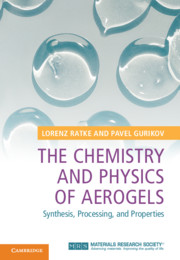Book contents
- Frontmatter
- Dedicatioin
- Contents
- Preface
- 1 Introduction
- 2 Chemical Synthesis of Aerogels from Monomeric Precursors
- 3 Chemical Synthesis of Aerogels from Polymeric Precursors
- 4 Gelation
- 5 Drying of Wet Gels
- 6 Morphology of Aerogels
- 7 Density: Models and Measures
- 8 Specific Surface Area
- 9 Pores and Pore Sizes
- 10 Diffusion in Aerogels
- 11 Permeability for Gases
- 12 Thermal Properties
- 13 Mechanical Properties of Aerogels
- 14 How to Cook Aerogels: Recipes and Procedures
- Appendix A Thermodynamics and Phase Separation in Immiscibles
- Appendix B Flory–Huggins Theory of Polymer Solutions
- Appendix C A Brief Review on Scattering
- Appendix D Mathematics of Polycondensation
- Appendix E Time-Dependent Heat Transfer through an Isolated Tube
- References
- Index
13 - Mechanical Properties of Aerogels
Published online by Cambridge University Press: 03 December 2021
- Frontmatter
- Dedicatioin
- Contents
- Preface
- 1 Introduction
- 2 Chemical Synthesis of Aerogels from Monomeric Precursors
- 3 Chemical Synthesis of Aerogels from Polymeric Precursors
- 4 Gelation
- 5 Drying of Wet Gels
- 6 Morphology of Aerogels
- 7 Density: Models and Measures
- 8 Specific Surface Area
- 9 Pores and Pore Sizes
- 10 Diffusion in Aerogels
- 11 Permeability for Gases
- 12 Thermal Properties
- 13 Mechanical Properties of Aerogels
- 14 How to Cook Aerogels: Recipes and Procedures
- Appendix A Thermodynamics and Phase Separation in Immiscibles
- Appendix B Flory–Huggins Theory of Polymer Solutions
- Appendix C A Brief Review on Scattering
- Appendix D Mathematics of Polycondensation
- Appendix E Time-Dependent Heat Transfer through an Isolated Tube
- References
- Index
Summary
Numerous daily-life materials exhibit a porous structure, e.g., foams made from different polymers (polystyrene, polyurethane), clays, tiles, bricks, oxide ceramics, bones, sponges, wood or diatoms. In many cases, the mechanical properties can be described by simple scaling laws with the relative or envelope density being the decisive factor. It is generally agreed that similar scaling laws apply to aerogels and xerogels, but the special nanostructured nature of aerogels and the mode used to form them out of a solution of monomers or polymers make an essential difference. A brief discussion of the conventional approach for closed and open cell foams or honeycombs based on the famous book written by Lorna J.Gibson and Michael F. Ashby on porous materials is given and extended to aerogels. Beforewe discuss aerogels, we briefly give for newcomers in the field of mechanical properties some textbook knowledge about mechanical testing. The chapter deals then with elastic and plastic properties of aerogels, compares modelling with experimental results and discusses deviations from classical porous media theory observed in aerogels.
Keywords
Information
- Type
- Chapter
- Information
- The Chemistry and Physics of AerogelsSynthesis, Processing, and Properties, pp. 356 - 387Publisher: Cambridge University PressPrint publication year: 2021
